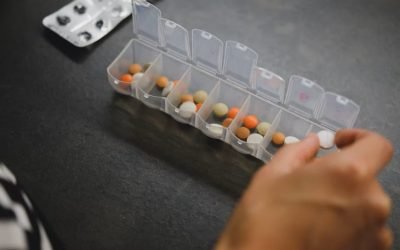Last updated: November, 2025
Prescription medications can bring relief, stability, and comfort when used as prescribed. But for some, the boundary between healing and dependence gradually fades. What begins as a treatment for pain, anxiety, or sleep problems can evolve into reliance… and eventually, addiction.
Across Europe, and increasingly in Spain, prescription drug dependence has become a growing public health concern. In Málaga and along the Costa del Sol, more people are seeking professional treatment in private, nature-based environments that support both physical and emotional recovery.
What is Prescription Drug Addiction?
Prescription drug addiction occurs when medications meant to help start taking control of daily life. Because they are prescribed by doctors, it can be easy to overlook the warning signs… until stopping becomes difficult or withdrawal symptoms appear.
Dependence can develop with various medications:
- Benzodiazepines (such as diazepam, lorazepam, or oxazepam) prescribed for anxiety or sleep.
- Opiates and painkillers (including oxycodone, tramadol, or morphine) used for pain relief.
- Sedatives and sleeping pills (like temazepam or zopiclone) that regulate rest and calm.
Over time, the brain adapts to these substances. Tolerance increases, and the body begins to rely on them to feel normal. When use stops suddenly, symptoms such as anxiety, restlessness, or insomnia may emerge making it even harder to quit without professional support.
Recognising the Signs of Prescription Drug Dependence
Many individuals are unaware they have developed a dependency until it begins to affect their wellbeing or relationships. Some common indicators include:
- Taking higher doses than prescribed
- Feeling unable to function without medication
- Hiding or downplaying medication use
- Experiencing anxiety, fatigue, or irritability when trying to stop
- Struggling with concentration or sleep
- Ignoring responsibilities, work, or social life
These behaviours can signal that the body and mind have entered a cycle of dependence — one that requires structured and compassionate intervention.
The Risks of Long-Term Use
Using prescription drugs beyond the recommended period can lead to serious physical and psychological consequences. Benzodiazepines can impair memory and coordination, while long-term opiate use can cause digestive and cardiovascular issues.
When combined with alcohol or other sedatives, the risks multiply. Breathing problems, confusion, or even overdose can occur. For this reason, a safe and medically supervised detox is often the essential first step in recovery.
Long-term dependence can also disrupt emotional regulation, causing depression, mood swings, and difficulty managing stress. Addressing both the physical and emotional sides of addiction is crucial for sustainable healing.
Why Málaga Is a Safe Place for Recovery
Choosing where to begin recovery is more than a logistical decision — it’s about finding an environment that feels calm, safe, and aligned with healing. Málaga, in southern Spain, offers one of the most restorative settings in Europe for addiction recovery. Its unique blend of sunlight, privacy, and community support makes it an exceptional place to regain balance and wellbeing.
Restorative Climate and Mediterranean Light
With over 320 days of sunshine a year, Málaga provides a stable, light-filled environment that naturally supports emotional regulation and circadian balance. Sunlight exposure helps boost serotonin and vitamin D, both vital for improving mood and energy levels.
This steady warmth and brightness make it easier to reconnect with daily rhythms and maintain a sense of hope throughout recovery.
Tranquil Nature and Complete Privacy
Nestled between the Sierra de las Nieves Natural Park and the Guadalhorce Valley, Málaga’s landscapes offer space, silence, and a feeling of retreat. The countryside around Álora (where Hacienda Paradiso is located) is peaceful yet accessible, surrounded by olive groves, wildflowers, and panoramic views.
This natural seclusion allows individuals to heal in privacy while remaining close to professional care and support.
A Welcoming and Supportive Community
Málaga’s culture is famously warm and open. Locals value connection, slow living, and genuine kindness, qualities that make it easy to feel accepted and at ease.
For those entering recovery, this sense of hospitality can make a profound difference, turning what might feel like isolation into belonging and understanding.
Accessibility and International Reach
Málaga is one of Europe’s most connected destinations. The Málaga–Costa del Sol Airport offers direct flights from major European cities, allowing individuals and families to reach treatment discreetly and comfortably.
This accessibility combines with the region’s safety, modern healthcare standards, and strong reputation for wellness tourism, making it an ideal location for international recovery.
Holistic Lifestyle and Mediterranean Wellbeing
Beyond its climate, Málaga embodies a way of life rooted in balance: fresh local food, outdoor activity, and time spent in nature. The Mediterranean diet, combined with sunlight and gentle physical movement, supports both mental and physical restoration.
The region’s rhythm invites a slower pace of living, helping residents and visitors alike rediscover calm and presence; essential pillars of sustainable recovery.
How Prescription Drug Rehab in Málaga Supports Lasting Recovery
Medical Detoxification Under Supervision
Prescription drug detoxification must be done carefully, under medical supervision. A gradual and monitored process ensures safety and comfort as the body readjusts to functioning without medication.
Benzodiazepine or opiate detox often requires close observation and tailored medical care to manage withdrawal symptoms. This stage provides a stable foundation for the psychological recovery that follows.
Therapeutic Support and Counselling
Once the body stabilises, therapy helps to uncover the emotional or behavioural roots of addiction. Cognitive Behavioural Therapy (CBT) supports individuals in identifying triggers and reshaping thought patterns.
Therapeutic work also includes trauma-informed care, mindfulness, and group support; all designed to rebuild trust, awareness, and emotional regulation.
Holistic and Mind-Body Healing
Addiction affects the whole person: physically, mentally, and spiritually. Integrating holistic elements such as movement, nutrition, rest, and nature helps restore balance. Gentle physical activity, time outdoors, or creative therapies can reconnect individuals with calmness and self-awareness.
In Málaga, many recovery programmes embrace this integrated model, allowing people to heal within peaceful surroundings that nurture both body and mind.
Finding the Right Prescription Drug Rehab in Málaga
Selecting a rehab centre is a deeply personal decision. It’s important to look for:
- Medical expertise in treating prescription drug dependence
- Personalised treatment plans that adapt to individual needs and history
- A holistic approach combining clinical care and emotional wellbeing
- A calm, private environment that allows space for rest and reflection
Choosing a centre that values compassion, privacy, and professional care ensures a safer and more sustainable recovery journey.
Healing in Hacienda Paradiso, Málaga
For those seeking a discreet and supportive setting, Hacienda Paradiso offers a unique space to recover from prescription drug addiction. Located in the foothills of Málaga, it is the world’s first eco-luxury rehab, where clinical care meets calm, nature, and connection.
Here, treatment is guided by medical professionals and therapists who understand the complexity of prescription drug dependence. Every programme is designed to restore balance through therapy, rest, and the healing presence of the natural world.
Frequently Asked Questions: Prescription Drug Rehab in Málaga
Málaga offers a combination of privacy, sunshine, and tranquility that naturally supports emotional balance during recovery. With over 320 days of light each year, individuals benefit from a restorative climate that reduces stress and improves sleep. The calm environment and welcoming culture make it easier to focus fully on healing, away from everyday pressures.
Treatment in Spain combines medical detoxification with psychological and holistic therapies. At centres like Hacienda Paradiso near Málaga, care begins with a medically supervised detox, followed by therapy to address the root causes of dependence. The process integrates rest, nutrition, and mindfulness, helping individuals rebuild both physical and emotional stability in a safe and supportive setting.
Yes. Travelling for treatment can be a powerful step toward change. Choosing a reputable and accredited centre ensures professional medical supervision and 24-hour care. In Málaga, international rehabs like Hacienda Paradiso are designed for privacy, comfort, and discretion; allowing residents to recover safely while being surrounded by nature and compassionate professionals.
The duration varies depending on the substance, dosage, and personal history. Most inpatient programmes last between four and eight weeks, followed by optional outpatient support. Longer stays are recommended for those needing extra time to stabilise, rebuild routines, and strengthen relapse-prevention skills before returning home.
Yes. Family support is an essential part of long-term recovery. Many rehab centres in Málaga encourage family participation through therapy sessions, education, or guided visits. Understanding how addiction affects relationships helps families heal together, build trust, and create a more supportive environment once the individual returns home.









